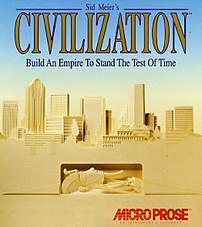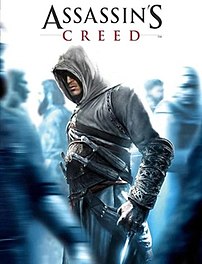
check it out - i won a t-shirt from Loot Ninja for writing a caption to this picture
http://loot-ninja.com/2008/12/29/winners-zombie-t-shirt-contest/
This blog serves as a place to talk about my experiences playing new-to-me videogames and hanging out in SecondLife. It might encourage others to try playing games and spending time in virtual worlds.
 Image via Wikipediaand one for the PSP. I have a couple PSP games at home already that I need to play. I figure I"ll blog some little summaries/reactions to the games and ideas I have about using them in assignments. We bought a lot of the games used and many don't have instructions which is a pain for me. I discovered tho that hte students don't read the videogame instructions (and were ticked that they had to read and understand the instructions for the board games we played. I have found good guides and instructions on the IGN site and have put links to them on our website
Image via Wikipediaand one for the PSP. I have a couple PSP games at home already that I need to play. I figure I"ll blog some little summaries/reactions to the games and ideas I have about using them in assignments. We bought a lot of the games used and many don't have instructions which is a pain for me. I discovered tho that hte students don't read the videogame instructions (and were ticked that they had to read and understand the instructions for the board games we played. I have found good guides and instructions on the IGN site and have put links to them on our website Image via WikipediaMeteos (for the DS) - a puzzle game. I bought it used and it didn't have the instructions. I think I need to read the guide I found on IGN - there are things going on on the screen that I had no understanding of even after playing for 2 hours and sometimes winning. As a puzzle game tho it's kind of typical - match the tiles up in groups of three to have them blast off. Things happen really fast tho - I'd concentrate on the right side of the screen and before I knew it I had lost because of something on teh left hand side. There's some kind of outer space theming - the falling tiles are takng place on different planets. I can see assigning students a group of puzzle games to compare or compare puzzle games on different platforms or different kinds of puzzles. And in the fun class we're going to talk about puzzles so it might be interesting to have them play puzzle games and see what the fun is. Someone I follow on Twitter recommended I check out the Disney verson of Meteos - I'm a big fan of all things Disney so I will look for it when I go shopping later.
Image via WikipediaMeteos (for the DS) - a puzzle game. I bought it used and it didn't have the instructions. I think I need to read the guide I found on IGN - there are things going on on the screen that I had no understanding of even after playing for 2 hours and sometimes winning. As a puzzle game tho it's kind of typical - match the tiles up in groups of three to have them blast off. Things happen really fast tho - I'd concentrate on the right side of the screen and before I knew it I had lost because of something on teh left hand side. There's some kind of outer space theming - the falling tiles are takng place on different planets. I can see assigning students a group of puzzle games to compare or compare puzzle games on different platforms or different kinds of puzzles. And in the fun class we're going to talk about puzzles so it might be interesting to have them play puzzle games and see what the fun is. Someone I follow on Twitter recommended I check out the Disney verson of Meteos - I'm a big fan of all things Disney so I will look for it when I go shopping later. Image via WikipediaLumines II (PSP) - another puzzle game - kind of like Tetris with the falling tiles but the tiles are made up of 4 smaller blocks and each block can be one of 2 colors. You have to maneuver the tile so that you get 4 smaller blocks of the same color in a 2 x 2 arrangement (not a 1 x 4 unfortunately - those I seem to be able to build with no problem). Themusic (in my opinion) is annoying. And some of the flashing skins are hard on my old eyes. The 2 x 2 squares don't disappear immediately - only when the timeline (that maybe is moving in time with the music, I can't tell because the music irritated me and I turned it off) crosses over it. The timeline is a neat feature they added to the tile matching puzzle. if you can work it right, you can stack up 2 x 3 or 3 x 3 (or bigger theoretically
Image via WikipediaLumines II (PSP) - another puzzle game - kind of like Tetris with the falling tiles but the tiles are made up of 4 smaller blocks and each block can be one of 2 colors. You have to maneuver the tile so that you get 4 smaller blocks of the same color in a 2 x 2 arrangement (not a 1 x 4 unfortunately - those I seem to be able to build with no problem). Themusic (in my opinion) is annoying. And some of the flashing skins are hard on my old eyes. The 2 x 2 squares don't disappear immediately - only when the timeline (that maybe is moving in time with the music, I can't tell because the music irritated me and I turned it off) crosses over it. The timeline is a neat feature they added to the tile matching puzzle. if you can work it right, you can stack up 2 x 3 or 3 x 3 (or bigger theoretically Image via Wikipedia
Image via Wikipedia Image via WikipediaSid Meier's Civilization (DS) - ok - i really don't like this kind of game - build units, place units, move units - turn based strategy. You go from the stone age to space age. There are several ways to win - that I like. It had a consistent use of the keys but i couldn't always figure out what triggered the end of my turn and it wasn't always clear to which units I'd already given a destination. It's a good example of in game tutorial level tho. Comparing the content of the tutorials with the directions for the board games we play might be interesting. Or examining the tutorial to see how they teach a variety of skills - what order does the tutorial put things in and is that the optimum pattern. This is definintely one I want to compare across platforms - what did they have to sacrifice to get it on the DS for instance. This isn't a picture of the DS version - it's just the only one I can find at the moment; I'll replace it when I can.
Image via WikipediaSid Meier's Civilization (DS) - ok - i really don't like this kind of game - build units, place units, move units - turn based strategy. You go from the stone age to space age. There are several ways to win - that I like. It had a consistent use of the keys but i couldn't always figure out what triggered the end of my turn and it wasn't always clear to which units I'd already given a destination. It's a good example of in game tutorial level tho. Comparing the content of the tutorials with the directions for the board games we play might be interesting. Or examining the tutorial to see how they teach a variety of skills - what order does the tutorial put things in and is that the optimum pattern. This is definintely one I want to compare across platforms - what did they have to sacrifice to get it on the DS for instance. This isn't a picture of the DS version - it's just the only one I can find at the moment; I'll replace it when I can. Image via Wikipedia
Image via Wikipedia Image via WikipediaI bought 5 new card games for the games classes - different game play mechanisms, some interesting themes, some 2 player and some 3-5 player, some by well-known designers
Image via WikipediaI bought 5 new card games for the games classes - different game play mechanisms, some interesting themes, some 2 player and some 3-5 player, some by well-known designers Image via WikipediaThe qualitative research class (2 sections) turned their final projects in on Friday. I"ll post some comments here about them as I grade and hopefully some good pictures that they took.
Image via WikipediaThe qualitative research class (2 sections) turned their final projects in on Friday. I"ll post some comments here about them as I grade and hopefully some good pictures that they took. Image via WikipediaSomeone suggested we add a topic about money for next semester and I like that idea - how people in SL think about hte in-world currency (do they actively try to earn money, what do they do with money, do they ever put in or take out real world money from the game...)
Image via WikipediaSomeone suggested we add a topic about money for next semester and I like that idea - how people in SL think about hte in-world currency (do they actively try to earn money, what do they do with money, do they ever put in or take out real world money from the game...) Image via WikipediaMass DDR at the Videogame Expo. They had 32 people all dancing at the same time on wireless metal dance pads. The screen at the front showed a bubble for each player to let them know beat by beat how they're doing. The top 10 scores (and dancer numbers) were shown oat the bottom of the screen. And people were having a great time. It wasn't just kids or girls - everybody was dancing together. The man running the show played songs at different difficulty levels so everybody could have a good time.
Image via WikipediaMass DDR at the Videogame Expo. They had 32 people all dancing at the same time on wireless metal dance pads. The screen at the front showed a bubble for each player to let them know beat by beat how they're doing. The top 10 scores (and dancer numbers) were shown oat the bottom of the screen. And people were having a great time. It wasn't just kids or girls - everybody was dancing together. The man running the show played songs at different difficulty levels so everybody could have a good time. Image via Wikipedianeed readings about fun, entertainment, humor, media psych, media entertainment, effects of personality/demographics, characteristics of media, context variables, player reasons for playing - right now leaning towards reading Raph Koster's A theory of fun for game design
Image via Wikipedianeed readings about fun, entertainment, humor, media psych, media entertainment, effects of personality/demographics, characteristics of media, context variables, player reasons for playing - right now leaning towards reading Raph Koster's A theory of fun for game design Image via Wikipediaa few notes from Day 2 of the workshop - we talked about testing, project management techniques, production techniques, localization, voice over and music, and relationships with external forces like marketing
Image via Wikipediaa few notes from Day 2 of the workshop - we talked about testing, project management techniques, production techniques, localization, voice over and music, and relationships with external forces like marketing Image via Wikipediaproducer has to do competitive, SWOT, and risk analyses - for competitive analysis look at past games that set the standard for the genre, present games that are selling well, announced but not yet released games to see key features, how you can position your game against hte competition - she says to write down for each competing game - title developer, publisher, platform, release date, game summary, key features, sales estimates, game reviews on things like metacritic, - can do in a spreadsheet
Image via Wikipediaproducer has to do competitive, SWOT, and risk analyses - for competitive analysis look at past games that set the standard for the genre, present games that are selling well, announced but not yet released games to see key features, how you can position your game against hte competition - she says to write down for each competing game - title developer, publisher, platform, release date, game summary, key features, sales estimates, game reviews on things like metacritic, - can do in a spreadsheet Image via WikipediaThis is the first of a couple of posts about the FuturePlay conference in Toronto in November 2008. It started on a good note - lots of tasty fresh fruit and yummy soup for lunch. The picture is the Toronto skyline from the CN tower (which I went up in. I have some of my own pics from the tower that I"ll post later. Now for the relevant stuff.....
Image via WikipediaThis is the first of a couple of posts about the FuturePlay conference in Toronto in November 2008. It started on a good note - lots of tasty fresh fruit and yummy soup for lunch. The picture is the Toronto skyline from the CN tower (which I went up in. I have some of my own pics from the tower that I"ll post later. Now for the relevant stuff.....


 Image via WikipediaGot some new games for the major - they'll be in ppecs soon. Some I got on multiple platforms so we can compare game control schemes and how well they take advantage features of the different hardware.
Image via WikipediaGot some new games for the major - they'll be in ppecs soon. Some I got on multiple platforms so we can compare game control schemes and how well they take advantage features of the different hardware.
 Image via WikipediaClick here to read post written by Dr. Lewis Pulsipher on his board game blog. He had his students create games by giving them a vinyl write-on/wipe-off chess board and some pieces. One group randomly scattered pieces to start the game.
Image via WikipediaClick here to read post written by Dr. Lewis Pulsipher on his board game blog. He had his students create games by giving them a vinyl write-on/wipe-off chess board and some pieces. One group randomly scattered pieces to start the game.
 The person leading the discussion was a male lion in a suit. He said they'd been a furry for more than 10 years. He stood in the center of the circle and moved to face people as they asked questions. He either typed very slowly or there was a lot of lag on his end - his typing animation would freeze for long periods; I thought he had been logged out a couple of times he was frozen so long.
The person leading the discussion was a male lion in a suit. He said they'd been a furry for more than 10 years. He stood in the center of the circle and moved to face people as they asked questions. He either typed very slowly or there was a lot of lag on his end - his typing animation would freeze for long periods; I thought he had been logged out a couple of times he was frozen so long.  A little while into the discussion a lady lion avatar sat down and was introduced as his mate. She didn't say anything and they didn't say anything publicly to each other during the class (don't know of course if they were IM'ing or if they were together physically). She seemed to be more human, more anthropomorphized, than the teacher did but not sure why it seemed that way but I think it was because she was dressed revealingly and I saw skin, not fur. Neither seemed to have paws - I saw fingers moving while he typed.
A little while into the discussion a lady lion avatar sat down and was introduced as his mate. She didn't say anything and they didn't say anything publicly to each other during the class (don't know of course if they were IM'ing or if they were together physically). She seemed to be more human, more anthropomorphized, than the teacher did but not sure why it seemed that way but I think it was because she was dressed revealingly and I saw skin, not fur. Neither seemed to have paws - I saw fingers moving while he typed.